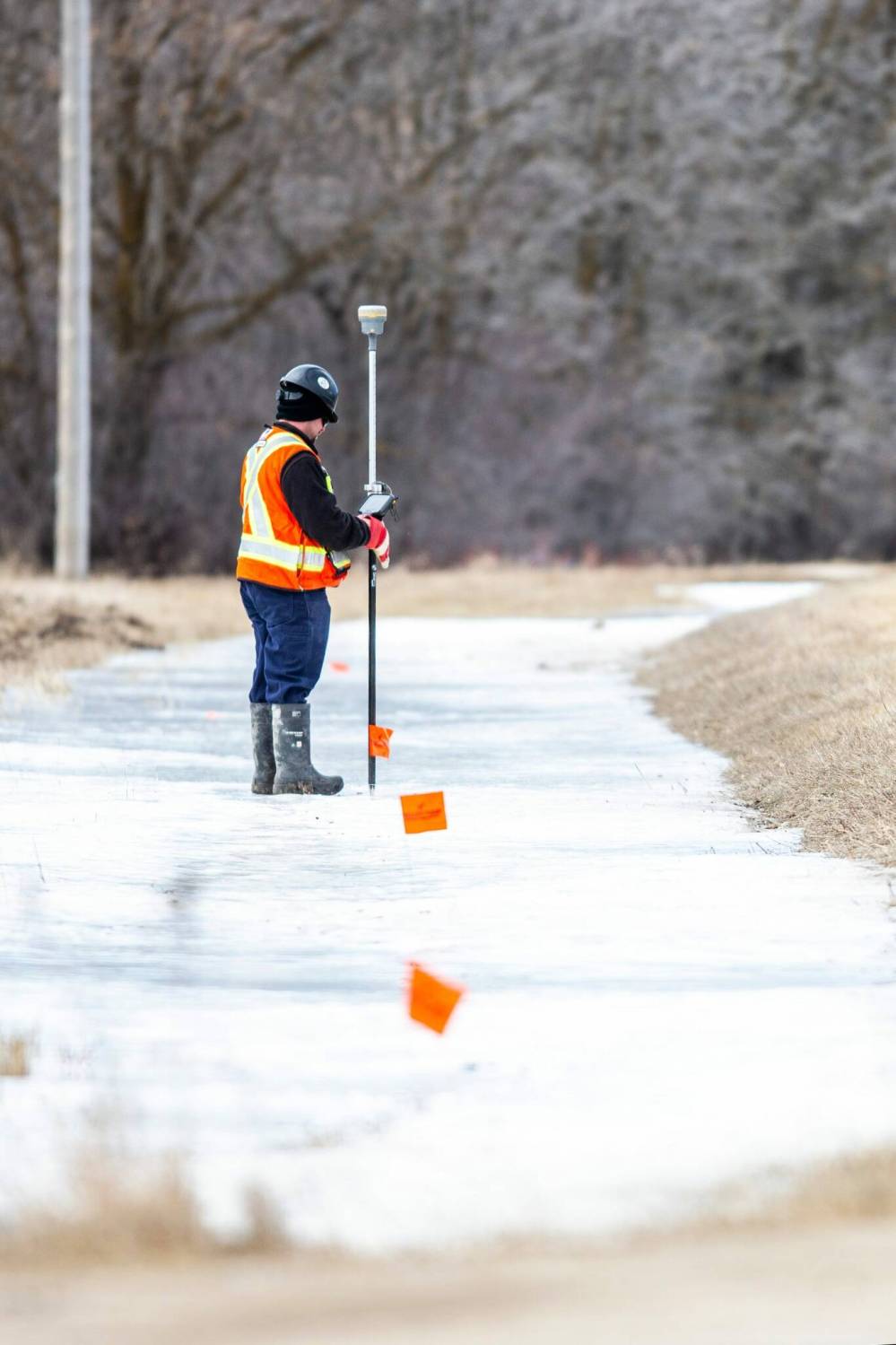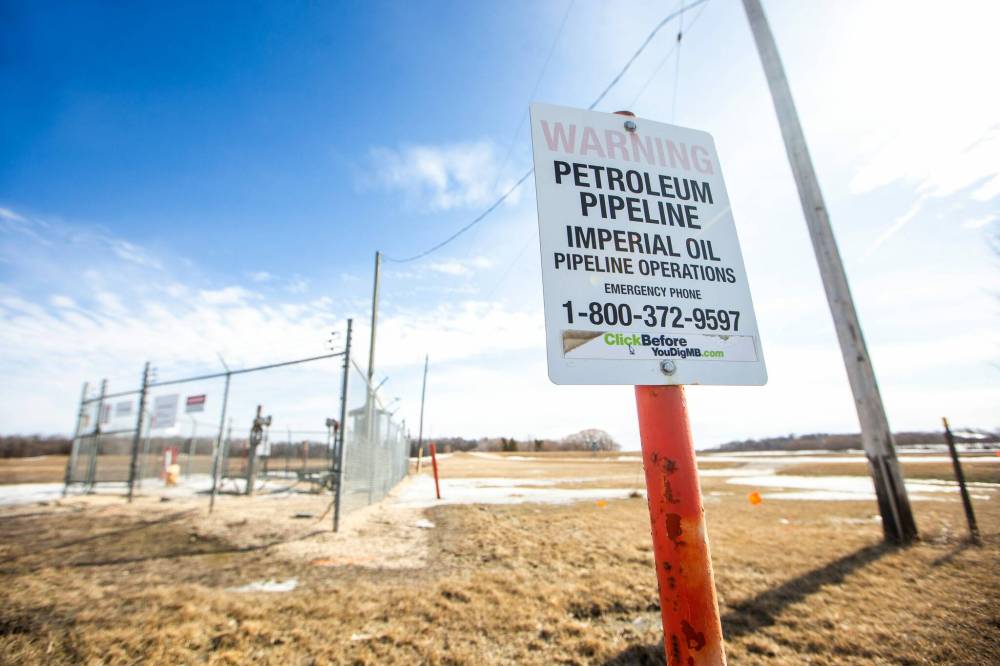No panic as city fuel supply shut off
Trucks, trains to cover three-month repair timeline, premier says
Advertisement
Read this article for free:
or
Already have an account? Log in here »
To continue reading, please subscribe:
Monthly Digital Subscription
$0 for the first 4 weeks*
- Enjoy unlimited reading on winnipegfreepress.com
- Read the E-Edition, our digital replica newspaper
- Access News Break, our award-winning app
- Play interactive puzzles
*No charge for 4 weeks then price increases to the regular rate of $19.00 plus GST every four weeks. Offer available to new and qualified returning subscribers only. Cancel any time.
Monthly Digital Subscription
$4.75/week*
- Enjoy unlimited reading on winnipegfreepress.com
- Read the E-Edition, our digital replica newspaper
- Access News Break, our award-winning app
- Play interactive puzzles
*Billed as $19 plus GST every four weeks. Cancel any time.
To continue reading, please subscribe:
Add Free Press access to your Brandon Sun subscription for only an additional
$1 for the first 4 weeks*
*Your next subscription payment will increase by $1.00 and you will be charged $16.99 plus GST for four weeks. After four weeks, your payment will increase to $23.99 plus GST every four weeks.
Read unlimited articles for free today:
or
Already have an account? Log in here »
Hey there, time traveller!
This article was published 18/03/2024 (640 days ago), so information in it may no longer be current.
The Kinew government promised to do everything it can — including expediting permits and expanding road weight limits, if needed — to avoid a fuel supply disruption after a pipeline shutdown diverted the main supply of Winnipeg’s gasoline, diesel and jet fuel.
“This is a situation that we’re going to have to live with as Manitobans for the next few months,” Premier Wab Kinew told reporters Monday.
“The first thing we’re doing is we’re using the weight of government to lean on these companies to do everything that they can to bring in gasoline, diesel, jet fuel, by truck and by train.”
MIKE DEAL / FREE PRESS FILES
The Imperial Oil distribution plant on Henderson Highway in East Saint Paul.
Manitoba is also looking at backup plans, such as getting fuel brought in from North Dakota, if necessary, he added. Fuel restrictions are not on the horizon, the premier said.
“We’re nowhere close to a conversation like that,” Kinew said, noting emergency preparedness officials are closely monitoring the situation and there’s no reason for the public to panic.
Imperial Oil announced Sunday it has temporarily shut down its pipeline that runs between Gretna and Winnipeg for necessary repairs. The pipeline will be down for about three months while crews replace a section that runs under the Red River about 30 kilometres south of Winnipeg.
In the meantime, gasoline, diesel and jet fuel will be brought in by rail and trucks. There are more than 50,000 barrels on train cars on their way to Winnipeg to bring fuel in, and there will be increased traffic on Highway 75 because of trucks travelling between the city and Gretna, Kinew said.
The Imperial terminal supplies about 12,000 barrels of gasoline per day to Winnipeg and surrounding communities. There’s about a week’s worth of fuel in Winnipeg right now, the premier said.
Both the provincial and municipal governments have activated their emergency operations protocol to monitor the situation. Right now, Manitobans are not being asked to make any changes to their gasoline usage.
“There are a lot of people working 24-7 right now just to ensure that there are no impacts, to do what they need to do to minimize or completely address any potential impact to the City of Winnipeg.”–CAO Michael Jack
City of Winnipeg chief administrative officer Michael Jack said he is feeling much more confident about the situation after a long meeting Monday with Imperial representatives about what their inspection uncovered and how they’ll execute fuel distribution while the pipeline is out of service.
“There are a lot of people working 24-7 right now just to ensure that there are no impacts, to do what they need to do to minimize or completely address any potential impact to the City of Winnipeg. So as of today, I’m feeling good and confident about where we’re going,” Jack told reporters Monday afternoon.
The impact on the city is expected to be relatively seamless, Jack said, but emergency preparedness officials are going over contingency plans and considering how the city can reduce its use of fuel over the next couple of weeks until Imperial’s rail workarounds are in place.
Most city vehicles, including Winnipeg Transit buses, rely on diesel. So far, officials don’t see a need to pull any city vehicles off the road.
“We have no reason today to believe that’s going to be necessary, but we are looking at every conceivable scenario,” Jack said. “Our emergency preparedness team do that constantly for any type of risk.”
Jack asked Winnipeggers not to panic and not to stockpile jerrycans of gas.
“We have learned that Quebec has a strategic reserve of maple syrup, but our country does not have a strategic reserve of gasoline, so somebody might want to do something about that.”–Premier Wab Kinew
“A discussion around gas can cause people to get anxious, and we simply don’t have any reason to think anybody should,” he said.
It was a more informed, calmer tone than he took in an email to councillors Sunday evening, warning them the shutdown might affect the supply of gas to the city. Jack said he didn’t mean to be alarmist in his email.
“Candidly, I don’t believe this PR statement accurately conveys the gravity of the situation; we have reason to believe the supply of gasoline products to the entire city (and beyond) may be compromised for a period of time. This is a rapidly developing situation, only having been raised to our attention earlier today,” Jack originally wrote.
The premier hinted at the need for stronger legislation and practices in Canada to shore up gasoline supply in case of unexpected disruptions.
“We have learned that Quebec has a strategic reserve of maple syrup, but our country does not have a strategic reserve of gasoline, so somebody might want to do something about that,” Kinew said.
Provincial and municipal emergency operations plans were put into action after Imperial’s announcement, which came just before 6 p.m. Sunday.
“Supply continues, it’s just how you get it from point A to point B.”–Dan McTeague
“Following inspections conducted in 2024, Imperial made the proactive decision to carry out preventative maintenance to ensure the continued integrity of the line. The work includes replacing a section of the pipeline that runs under the Red River, south of Winnipeg. As a result, the line will be out of service for approximately three months beginning in mid-March,” an Imperial Oil spokesperson wrote in the Sunday statement. There was no gas leak nor break in the pipeline, the statement said. It said “proactive pipeline inspections identified integrity concerns” in a section of the line just south of St. Adolphe.
An Imperial Oil spokesperson said Monday the corporation had no updates to provide. The volume of fuel flowing through that pipeline, and how much fuel it supplies to Manitoba, is considered proprietary information, the spokesperson said.
“The province is engaged in oversight of the repair work to ensure all precautions are taken to protect the surrounding environment,” a statement from the province said Sunday.
Maintaining fuel supply to the airport, the trucking industry and farming operations will be important for Manitoba’s economy, Dan McTeague, president of Canadians for Affordable Energy and operator of the online gas-price predictor database gaswizard.ca, said.
“The important part is to make sure the province’s economy is not adversely affected,” he said. “I’m confident this will not mean an increase in prices as a result of this.”

MIKAELA MACKENZIE / FREE PRESS
A crew works along the Imperial Oil pipeline just south of St. Adolphe, near the Red River, on Monday. The line that supplies Winnipeg with fuel will be closed for up to three months for repairs.
Governments and fuel suppliers will have to work together to make sure the fuel can be trucked in.
“Supply continues, it’s just how you get it from point A to point B,” McTeague said.
Imperial still has its supply, and there are a number of gas pipelines and a Shell terminal in the area. Gas stations will likely receive shipments on a rotating basis, which might present a slight inconvenience for customers, he said.
“There may be a minimal amount of disruption for consumers who, from time to time, may see their favourite gas station closed for a couple of hours because it’s run out of fuel. That’s about the end and extent of it. I don’t see this as going any further,” McTeague said. “There is no real reason to panic.”
It’s a good sign Imperial is dealing with the maintenance before a pipeline rupture occurs, he said, adding consumers must be assured the system can “be nimble” when it has time to prepare for situations like this one.
Gas prices are fairly stable in Winnipeg and surrounding areas — around $1.34 per litre — and any price increases on the horizon are more likely to stem from disruptions at U.S. refineries, McTeague said.

MIKAELA MACKENZIE / FREE PRESS
The pipeline brings in diesel, gasoline and aviation fuel.
— with files from Joyanne Pursaga, Danielle Da Silva and Carol Sanders
katie.may@freepress.mb.ca

Katie May is a multimedia producer for the Free Press.
Our newsroom depends on a growing audience of readers to power our journalism. If you are not a paid reader, please consider becoming a subscriber.
Our newsroom depends on its audience of readers to power our journalism. Thank you for your support.
History
Updated on Monday, March 18, 2024 4:04 PM CDT: Adds new comments from CAO, new headline
Updated on Tuesday, March 19, 2024 6:31 AM CDT: Adds photos
Updated on Thursday, March 21, 2024 11:00 AM CDT: Corrects figure to 50,000 barrels on train cars









